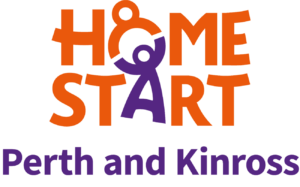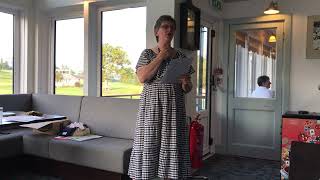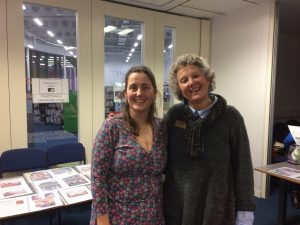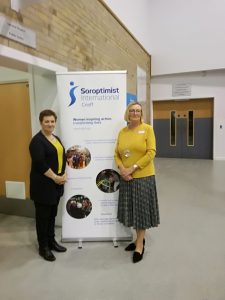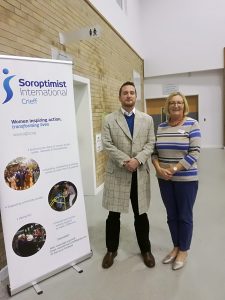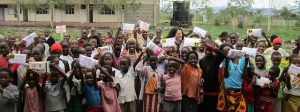7 April 2022 SI Esperance
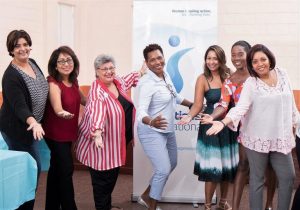 It is understandable that members of an organisation with the word ‘International’ in its title should be interested in hearing first hand about a sister club in another country so members of SI Crieff were delighted to have Denyse Ewe, President of SI Esperance in Trinidad, join their meeting virtually on 7 April.
It is understandable that members of an organisation with the word ‘International’ in its title should be interested in hearing first hand about a sister club in another country so members of SI Crieff were delighted to have Denyse Ewe, President of SI Esperance in Trinidad, join their meeting virtually on 7 April.
Denyse herself has been a Soroptimist for 11 years and SI Esperance, one of seven Trinidadian clubs, was formed three years ago. Denyse is a former modern languages teacher and translator and has recently completed a law degree so now hopes to pursue a legal career. She spent five years in Glasgow while her husband was studying there so has fond memories of living in Scotland and had an easy connection with our members.
SI Esperance has roughly the same number of members as SI Crieff, though they also have a fair number of new members set to join within the coming months. However, as one might expect considering the differences in climate and lifestyle, conditions and activities (and in fairness the possibilities open to them there), do differ somewhat from here although of course the aims of working towards helping girls and women do not.
Members of Esperance range in age from under 30 to 95 (Ursula at 95 sounded one of the most active members) and broadly speaking the younger ones are more active in fundraising and energetic activities while those more mature are more likely to concentrate on visiting schools, talking to people about Soroptimism etc, but Denyse was at great pains to stress the importance of the dynamics and teamwork amongst all club members which contribute so much to its continuing success.
Club members, with keen support from local businesses and individuals, organise a major golf tournament annually which raises thousands of pounds, a Green Market at which local women were invited to take stalls selling home grown produce in a play park was a big success and a fundraising Zumba dancing event to boost health and fitness proved a big draw. They certainly have plenty of ideas and are not afraid to ‘think big’.
It is also hoped that another ‘Sisterhood Sunday’ Development Day will be organised. Information about Soroptimism is delivered by members to schools and by word of mouth and there, as in many such countries, it is met with interest and enthusiasm.
There are a lot of Venezuelan immigrants to Trinidad and SI Esperance members work to combat violence against women and human trafficking. They also offer help to families suffering from effects of the pandemic and, in partnership with Microsoft, encourage young people to study STEM subjects as well as IT. Another area where they offer support is in three local schools, alleviating period poverty by supplying young girls with sanitary products thereby preventing them from having to miss school each month.
So, as can be seen, SI Esperance is a particularly enthusiastic and busy club. It was interesting to hear how some issues and problems are common to all no matter where in the world – and also good to hear of different ideas for raising awareness as well as always needed funds even if it was perhaps brought home to those of us listening that some activities are easier in some places than others!
17 March 2022 Roisin Dermody, Disabled Women Ireland
 On St Patrick’s Day, SI Crieff’s guest speaker via Zoom was Roisin Dermody, a leader within the Disability Rights movement in Ireland. Roisin is a co-founder and board member of Disabled Women Ireland (DWI) which is Ireland’s national Disabled People’s (DPO) for Disabled Women and Disabled Gender Minority People.
On St Patrick’s Day, SI Crieff’s guest speaker via Zoom was Roisin Dermody, a leader within the Disability Rights movement in Ireland. Roisin is a co-founder and board member of Disabled Women Ireland (DWI) which is Ireland’s national Disabled People’s (DPO) for Disabled Women and Disabled Gender Minority People.
DWI’s mission is Equality, their belief being that gender equality rights and disability rights can only be achieved if fought for together. Across the organisation, members have a wide range of impairments and intersecting identities and they believe the only way to achieve real change is to advocate from an intersectional feminist approach.
They work to break down the barriers which marginalize and isolate people with disabilities in a way that is inclusive and accessible to all.
Roisin herself was born with severe sight impairment and in recent years has become totally blind. This disability unsurprisingly affected her education, at the age of four she was sent to a special boarding school but after a few years she insisted she be allowed to attend mainstream education. She endured bullying at both and this in turn caused her mental health to suffer, a not uncommon extra problem for people who are bullied.
However, always an amazingly determined fighter and survivor, in due course and after a couple of false starts, Roisin graduated from University College Dublin with a BA in Music and Classics, a Certificate in Women’s Studies, an MSc in Equality Studies and an MSc by research in Social Justice.
Her goals had always been to work for Amnesty International and the UN, both of which she achieved as well as working for the Irish Human Rights and Equality Commission. She now works in the Department of Justice within Criminal Justice Policy Research.
03 March 2022 The Stones of Strathearn
Soroptimist International of Crieff were delighted to receive a very informative and entertaining talk from Mr Andrew Finlayson, who is the author of ‘The Stones of Strathearn’. Andrew’s passion for his topic was clear when he described to club members the history behind the landscape of Strathearn. Explaining that the number of standing stones in Strathearn is extraordinary, Andrew said “The whole phenomenon of the erection of stones started in this country around 5000 years ago following from the effects of volcanic ash clouds from Iceland, climate change and the faltering of long-held belief systems. Déjà vu! These places functioned at the heart of our earliest farming communities for perhaps 50 generations and likely went out of use some 1000 years before the Romans invaded.”
Andrew’s book covers geological facts of the area, members were interested to hear that stones were used as geological time pieces carefully positioned to plot the position of the moon. The stones were described as the earliest architecture of the area.
It was clear that the geological landscape provided invaluable historical information about the people who had created them, as well as an insight into how climate change is eroding our beautiful landscape.
Members agreed that they had been reminded of how fortunate they were to live within such a beautiful landscape.
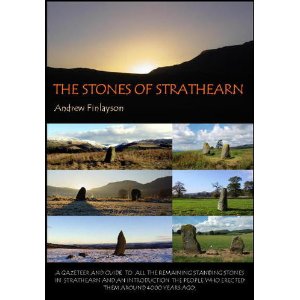
03 February 2022 Smalls for All
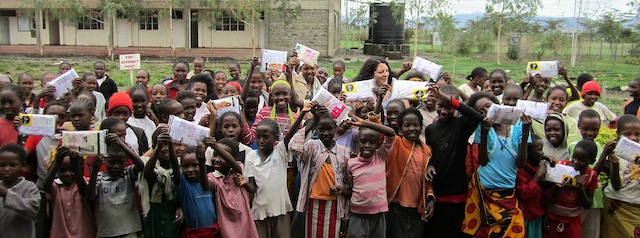 Marian Sapcote of SI Dunfermline spoke to members of SI Crieff about ‘Smalls for All’ a Scottish charity that has grown considerably since being founded in 2010 by Maria Macnamara. SI Crieff along with other SI clubs in Scotland have supported Smalls over recent years and members were interested to learn more of its background and success.
Marian Sapcote of SI Dunfermline spoke to members of SI Crieff about ‘Smalls for All’ a Scottish charity that has grown considerably since being founded in 2010 by Maria Macnamara. SI Crieff along with other SI clubs in Scotland have supported Smalls over recent years and members were interested to learn more of its background and success.
After returning home from working as a volunteer in orphanages in Africa and Brazil, Maria felt the need to do something sustainable rather than offer the short lived support she felt her somewhat fleeting visits gave. She thought of how so many women and girls particularly in poor African areas often possess only one pair of tattered pants or indeed none at all. This is obviously a health and hygiene issue but also a matter of dignity and can result in many girls missing school for days every month and so affect their education.
And so ‘Smalls for All’ was born and to date over 1.7 million items have been sent to orphanages, schools and hospitals particularly for patients following treatment for obstetric fistula, a common condition in Africa with two million sufferers.
Initially only new pants were collected but then new or gently-used bras (of any size or colour) were also collected, sent, distributed and gratefully received. Other items of underwear are frequently offered to the charity but the one request is that pants should be suitable for wearing with appropriate sanitary products so thongs and such like (or suspender belts) cannot be accepted. If there are surplus items these can be sold and funds raised go towards sponsoring education for children in Kenya and Malawi.
Initially storage of donations was in Maria’s garage then also her friends’ garages and then when that was still not enough space, a unit was offered free of charge in Livingston though this had no services so was not ideal and in time the current premises in West Calder were found. Volunteers work there three days a week and donations of items and/or money may be handed in. Full information is available on www.smallsforall.org.
In 2019 the Smalls constitution was amended to also support people in the UK who need underwear. Pants for men and boys are also collected and distributed. Sadly in this day and age even in the ‘affluent’ UK, there is need amongst homeless people, refugees and school uniform banks. One popular slogan is ‘Say Pants to Poverty’.
The charity has a number of partner organisations who are happy to share transportation/shipping arrangements thus helping keep costs down, and also avoids posting anything to Africa which is expensive and unreliable – things often do not reach their destination.
Altogether an interesting, enlightening, touching and at times amusing talk enjoyed by SI Crieff members and their guests as described by Julie McVey in her vote of thanks to the speaker.
20 January 2022
 A number of members of SI Crieff have had close connections with Strathearn Building Bridges over many years although of course during the past couple of years most SBB activities have had to be virtual. Contact between the two clubs however has not been lost and at the first SI club meeting of 2022 Gillian Charleson spoke to members about SBB, how they have coped with lockdown and how face to face activities and ‘normality’ are now resuming much to the delight of members and carers.
A number of members of SI Crieff have had close connections with Strathearn Building Bridges over many years although of course during the past couple of years most SBB activities have had to be virtual. Contact between the two clubs however has not been lost and at the first SI club meeting of 2022 Gillian Charleson spoke to members about SBB, how they have coped with lockdown and how face to face activities and ‘normality’ are now resuming much to the delight of members and carers.
SBB was set up to ‘build bridges into a better quality of life for people with learning difficulties and other disabilities and their carers in Strathearn’. It evolved from The Tuesday Club many years ago leading to numerous varied activities – practical, domestic, craft, sporting and entertainment – never forgetting the element of fun – with the view of integration into the community and enabling/equipping everyone to live as independent a life as possible.
Over the years quite a few SI Crieff members have been involved for example with the Saturday Lunch Club, others with The Film Club on Wednesday afternoons and a number have joined with SBB members acting as Gamemakers at Crieff Highland Games until the pandemic sadly meant their cancellation over the last two years, though hopefully 2022 will see them return.
SI Crieff members thoroughly enjoy joining in SBB’s activities, the Lunch Club is reputed to be ‘the best fun ever’ for all concerned and it is debatable which club looks forward more to its return.
Maddy King thanked Gillian for her interesting talk which brought back many happy memories to those members who have already been involved as well as giving more recent members insight into SBB’s activities and aims.
21 October 2021 
Firefighter Rhonda Jones spoke to members of SI Crieff about her inspirational and interesting life leaving members feeling perhaps just a little inadequate.
Rhonda is a Crew Commander based in Bo’ness with The Scottish Fire & Rescue Service, (SFRS) a job she absolutely loves, but she is also founder of YAMS (‘You Are My Sunshine’), a charity very close to her heart set up in memory of those who have lost their lives due to mental illness and offering help to all those affected.
Rhonda’s working background is one of Childcare, Graphic Design and Football, all before joining SFRS six years ago.
Although Rhonda was a very poorly baby, born with very serious problems requiring major surgery while she was very young, she was always recognised as having the heart of a lion and indeed grew up to become Gala Queen and Most Promising Footballer in the same year, a previously unknown achievement.
Aged 13, she was playing eleven-a-side football, aged 17 she was playing for Scotland – she was capped 117 times – and aged 21 she gained a scholarship to Florida Atlantic University to study Graphic Design and play football professionally – in addition to working in a full time job. In 2009 she won a place in The University Athlete Hall of Fame.
After completing her course, Rhonda worked in the university as a graphic designer for five years, returning to Scotland when her mother was diagnosed with breast cancer and her sister had mental health problems. She did sports coaching and worked in a children’s residential school then decided to return to college to study for an HNC in Social Care.
This led to working in Edinburgh with children who came from problem backgrounds and were no longer with their parents, a job Rhonda adored, but after five years, in January 2017 when she was aged 36, she decided to change from ‘not just helping people but saving lives’ returning to charity work and also joining SFRS, initially in a desk job although through sheer hard work she progressed within a few months to working on the front line. By this time she had decided to give up football but had set up YAMS in April 2018
Very sadly, Rhonda recently lost her sister Gemma who took her own life at the age of 29 after years struggling with mental health issues. Gemma left behind two children of nine and four orphaned as their father had commited suicide a few years before. Rhonda, heartbroken by the loss of her sister and the plight of the children and also aware of the appalling local suicide rates, has put huge efforts into which has already offered help to thousands of people, all free of charge, through their ‘one stop shop’ which directs people to the appropriate sources of help. YAMS has 25 enthusiastic and selfless volunteers all ready to help those in desperate need.
And, in addition to all the above, Rhonda is determined to become Watch Commander with SFRS through her continuing hard work.
It was mentioned in the vote of thanks that Rhonda is a wonderful young woman who has achieved a huge amount – and is still just 42!
9 October 2021
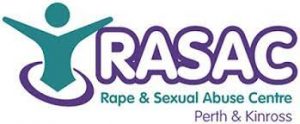 Jen Stewart, who has been Manager for 13 years of RASAC (Rape and Sexual Abuse Centre) Perth, gave a talk about their work to members of SI Crieff last week. RASAC Perth is one of the 17 independent members of Rape Crisis Scotland Network. The Perth service was set up in 2007, prior to that any assistance had to come from Dundee, an unsatisfactory arrangement for the needs in Perth and area.
Jen Stewart, who has been Manager for 13 years of RASAC (Rape and Sexual Abuse Centre) Perth, gave a talk about their work to members of SI Crieff last week. RASAC Perth is one of the 17 independent members of Rape Crisis Scotland Network. The Perth service was set up in 2007, prior to that any assistance had to come from Dundee, an unsatisfactory arrangement for the needs in Perth and area.
Clearly right now the subject of Violence Against Women (VAW) is particularly topical. Jen explained in detail how everything is even more difficult at the present time anyway due to the rise in domestic violence because of the pandemic over the past 18 months. This has virtually imprisoned a lot of women in their homes with extremely limited contact with the outside world and sources of help, or even awareness, from family and friends.
RASAC’s office was closed throughout much of lockdown although staff continued to work and offer help as much as possible by phone and Zoom but obviously this was very restricted.
The four main headings under which RASAC operates are Prevention, Provision, Participation and Protection. They offer help and support to families and friends of victims and also to young people aged 12 to 18. Resources are never sufficient to meet demand and at the monent there can be a waiting time of four months for help but one of their most successful undertakings has been the Youth Ambassadors Scheme aimed at spreading the word amongst young people and in schools of how violence against women is never acceptable and must be stopped. It was acknowledged that violence against men does also exist but this is a relatively rare occurrence and if reported advice ‘re appropriate help is available.
The phone number for RASAC Perth is 01738 626290.
2 September 2021 – A 1924 Grand Tour
SI Crieff started their 2021/22 session on Thursday 2 September at Crieff Golf club. This was the first time the club was able to meet face to face after pandemic restrictions. The speaker for the evening was local artist Sybil Galbraith, who is also a member of the club.
Sybil has had a very varied career from working in industry and the art sector. As a mature student she returned to her love of art, through the College of Art in Johannesburg. For paintings she uses watercolour, taking her inspiration comes from observing the natural world. This year she has designed the 2022 Crieff Calendar.
As a published author, Sybil informed and entertained the club by talking about her recent publications. The first was her great grandmother’s cookery book, which she translated from Dutch. Attention was drawn to the large quantities in the recipes, which was due to the need to feed everyone on the farm at the same time. In her talk Sybil provided a lot of social history of the time (1884 ). She described how she was able to visit the actual farm in South Africa where her great grandmother had lived.
Her second publication was entitled ‘A 1924 Grand Tour’ taken from a handwritten diary kept by her ‘grannie’ when she came to the Great Empire Exhibition and a tour through Europe with her husband. The diary was written in Afrikaans, requiring translation and further research on the details.
The trip lasted three months and took place in August 1924. One of the first challenges was planning for the European weather having left South Africa in mid-summer. Their travels took them to London, Edinburgh, Aberfoyle, The Trossachs, Glasgow, Holland, Amsterdam, Germany, Austria, Switzerland, Italy, France, Belgium. Arriving back in South Africa in November 1924.
Highlights of the trip included meeting Jackie Coogan, the American actor and comedian, tea at the Lyons Tea Room in London, crossing the Forth Railway Bridge, and staying at the (then) North British Hotel in Edinburgh. The diary also included descriptions of European Mountains and lakes, beautiful art and concerts by wonderful orchestras.
This provided a very informative and entertaining talk for club members.
3 June 2021 Perth & Kinross Fairtrade Zone
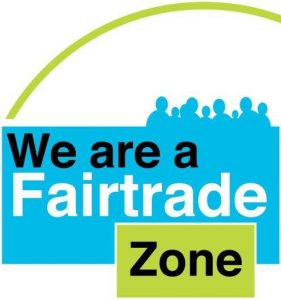 At the last club meeting before the summer break, SI Crieff members were given a talk on Fair Trade by Karena Jarvie, Chairman of Perth & Kinross Fair Trade Zone. In 2015 P&K became the 21st of Scotland’s 32 local authorities to become a Fair Trade Zone.
At the last club meeting before the summer break, SI Crieff members were given a talk on Fair Trade by Karena Jarvie, Chairman of Perth & Kinross Fair Trade Zone. In 2015 P&K became the 21st of Scotland’s 32 local authorities to become a Fair Trade Zone.
Most people are familiar with the Fair Trade logo on bananas, coffee, flowers and chocolate but may not realise quite what is behind it. There is also another Fair Trade logo for crafts.
The World Fair Trade Organisation have compiled 10 principles to which organisations and businesses claiming to be Fair Trade must adhere on a day to day basis and these are strictly monitored.
1. Opportunities for Disadvantaged Producers
2. Transparency and Accountability
3. Fair Trade Practices
4. Fair Payment
5. No Child Labour, No Forced Labour
6. No Discrimination, Gender Equity, Freedom of Association
7. Good Working Conditions
8. Capacity Building
9. Promote Fair Trade
10. Respect for the Environment
Fair Trade was born out of a desire to create parity for farmers and producers in the developing world. When you buy these products you are assured the producer has been paid a proper wage and works in decent conditions. It addresses many issues resulting from unfair competition, enabling smaller producers in developing countries to compete on a level playing field. To participate in Fair Trade you must commit to paying sustainable prices which cannot fall below market value.
It is clear from the above principles that it is not all about the price – transparency is absolutely essential, child labour is not allowed, gender equality demanded, good working conditions required, all things taken for granted in the developed world. Also, point no 10 referring to the Environment is very much a topic for today. It was interesting to learn for example that flowers grown and flown in from Africa incur a far smaller carbon footprint than those from The Netherlands, the reason being the climate in Africa does not require the use of energy needed in Holland.
Altogether an interesting subject, and it may well be worth taking a moment when next picking up that bunch of flowers, bananas or jar of coffee to check for the Fair Trade logo.
Karena Jarvie is the Chairperson of Perth & Kinross Fairtrade Group and has supported Fairtrade for many years by running a Traidcraft stall at Kinross Parish Church. In her working life Karena is an Educational Psychologist, so all her Fairtrade activities are in my spare time. Karena discovered that Perth & Kinross was not a Fairtrade Zone and with the support of other interested people and councillors she achieved the certification in 2017 which made us the 25th Local Authority out of the 32 in Scotland to become a Fairtrade Zone.
The next club meeting for SI Crieff members will not be until September but anyone interested meanwhile can visit our website https://sigbi.org/crieff or call Heather on 07796 031510
21 May Climate Action Strathearn & Crieff Co-op
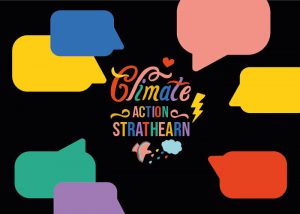
 Soroptimists during May have been challenged to reduce their use of single use plastic to help the environment. Speakers for the evening were Jodie Ball of Climate Action Strathearn, Gary Pugh, Manager of Crieff Co-op with Alexandra MacDonald of the Co-o
Soroptimists during May have been challenged to reduce their use of single use plastic to help the environment. Speakers for the evening were Jodie Ball of Climate Action Strathearn, Gary Pugh, Manager of Crieff Co-op with Alexandra MacDonald of the Co-o
7 May 2021 – Elizabeth Philip. Crieff Connexions
Elizabeth Philip of Crieff Connexions Community Hub talks to the members of SI Crieff and explains what services the hub provides for the community.
November 2020 – Katie Lang, Joint Regional President, SI Scotland North Region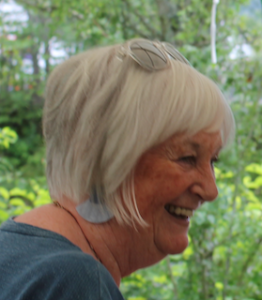
Katie Lang is a well-kent face at SI Crieff, and has been an active SI member for 13 years. Katie spoke to the club about her journey as a Soroptimist and her current role as Joint Regional President of Scotland North region. As a new Soroptimist member Katie had no intention of taking office. Her first role was the Programme Action Convener for the Crieff club. With little knowledge, she learned quickly and successfully oversaw many creative and innovative Programme Action projects. By this time Katie had caught the bug, and she moved on to Social and Fundraising and then back to Programme Action. Progression within the club saw Katie become club Vice President, club President Elect and then club President, all this from a member who did not want to take office! Katie is well know for her enthusiasm, creativity and sense of fun.
One of Katie’s proudest achievements was getting the club involved with Strathearn Building Bridges, which over the years has provided a friendly supportive, FUN environment to people who have additional support needs in the Crieff area.
Katie has completed a year as President for Scotland North Region, and is currently Joint President for Scotland North Region.
Click the link below to listen to Katie’s very interesting talk about the opportunities she has had a Soroptimist, to make a difference.
October 2020 – Ian Baird, Woodland Trust Volunteer
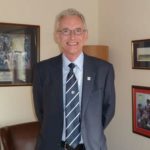 Ian Baird gave an illustrated talk about The Woodland Trust to members of SI Crieff, an appropriate subject as this is the Centenary of the first Soroptimists and one of the main projects to mark the milestone is the worldwide planting of trees. This project partly reflects action taken by the earliest Soroptimists to save giant redwoods under threat in California but also the recognition of how essential trees are to mankind.
Ian Baird gave an illustrated talk about The Woodland Trust to members of SI Crieff, an appropriate subject as this is the Centenary of the first Soroptimists and one of the main projects to mark the milestone is the worldwide planting of trees. This project partly reflects action taken by the earliest Soroptimists to save giant redwoods under threat in California but also the recognition of how essential trees are to mankind.
Although it may seem unlikely to those of us living in what is a particularly leafy area, nationally and internationally there is a severe lack of trees. Just think for instance of the vast deforestation in Asia and South America, often to increase ground for farming and palm oil as well as building development. All at a huge cost to nature, an increase in pollution, a threat to health and aggravating climate change. Of course a lot of timber has also always been used commercially in building, shipbuilding, etc.
We are all familiar with large bare, virtually barren, areas in Scotland many of which do not look as if they ever were wooded but for thousands of years most of the land was covered with ancient woodland. Nowadays only 18% of Scotland (and merely 13% of the UK in general ) is covered by trees – and just 4% of this is covered by native species which are defined as ‘species that have been in existence and regarded as being around at the end of the Ice Age’. Europe does rather better with 38% of land being wooded.
The mission of The Woodland Trust is to create, protect and restore native woodland for people and wildlife and that this should be accessible to the public. The Trust is involved with community groups, they can provide trees for planting and give guidance on what is suitable for an area. The best time for planting is November to March while the trees are dormant. This year, due to it not being possible to work with schools as they usually do, the Trust has an excess of trees and is happy to donate these along with their expertise to see the expansion and creation of native woodlands where people and wildlife can benefit. Because of its very nature, flora and fauna can thrive in such surroundings, unlike in areas where large tracts of non native pine trees are planted usually by The Forestry Commission for commercial purposes, which can often be seen as big regimented dark patches on hillsides. No wildlife or plants can thrive in such dark areas, unlike amongst native woodland which offers great conditions for animals, insects, plants and flowers as well as ‘the great outdoors’ for people.
The Woodland Trust was founded in Devon in 1972 by Kenneth Watkins, who realised he himself through his work had actually caused some of the damage in SW England. Along with some others he formed a Trust which bought up Avon Woods in Devon. Now based in Grantham, the Woodland Trust manages 1000+ woods and has planted 32 million trees over a period of 45 years. They have almost a million supporters with over 3000 volunteers, 400 of them in Scotland, and are very keen to offer practical support locally to people keen to help the environment.
SI Crieff have plans to plant trees locally with the help of other organisations in addition to The Woodland Trust.
September 2020 – Vivienne Hyndman, Humanist Celebrant
Soroptimist International Crieff’s Autumn/Winter session kicked off with a talk by local Humanist Celebrant Vivienne Hyndman. As a Celebrant, Vivienne officiates at funerals, weddings and naming ceremonies, mostly in the Comrie and Crieff area, in locations as varied as the Cultybraggan Camp and De’ils Cauldron waterfall. Vivienne chose as her theme “change”, which was very fitting as this was the club’s first meeting with a speaker using ‘Zoom’, with all the members tuned in from their own homes.
In her varied and interesting career, Vivienne stressed the importance of being “open to change”, which helps to “knock on the door” of opportunities that present themselves. This helped Vivienne progress through a number of career changes , building on personal interests and skills, such as an interest in people, good listening skills, and a strong belief in paying back to the community. This saw her working to build local economic development in some of the poorest parts of Glasgow, and as a history teacher in Perth, where she spent fifteen years motivating and encouraging young people.
At the age of 57, as she approached retirement, Vivienne saw a useful new way to apply her skills and experience by retraining as a Celebrant for the Humanist Society. In sharing her experiences, Vivienne highlighted the importance of making real connections with people – often during periods of extreme sadness and joy. This is done by getting people to share their own memories, and building on their own unique stories. Vivienne said “it is a real privilege to be asked to be part of very personal parts of people’s lives”.
The Soroptimists of Crieff enjoyed hearing about Vivienne’s career and found her positive attitude to change very inspiring.
If you would to know more about Soroptimist International Crieff you can visit our website www.sigbi/crieff
Vivienne Hyndman can be contacted at https://www.humanism.scot/ceremonies/find/3/vivienne-hyndmanhumanism-scot/
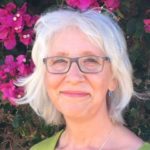 Listen to Vivienne’s very interesting talk here https://youtu.be/EAL2KbbdM0Y
Listen to Vivienne’s very interesting talk here https://youtu.be/EAL2KbbdM0Y
Feb, 2020 – Rebecca Dearman, Sapana School in Nepal
Katie Lang introduced Rebecca Dearman, a Supply Teacher at Crieff Primary School, who spoke to the club about Sapana School in Nepal which is twinned with Crieff PS. Rebecca was responsible on behalf of CPS for the twinning and has visited Sapana a few times. The name translates as ‘dream’ – the Sapana project was in fact the dream of a local Nepalese man, Djurba, who wanted to create somewhere in his community which was completely equal for all.
The area being on the plain is not the destination of most visitors to Nepal who go to trek or climb. A lot of people had been displaced when a national park was created and his vision was for them to be self sufficient, though a Dutch charity did, and continues to, lend some support, particularly to local farmers. A microbusiness was set up for local women to sew craft items to sell and make money to pay for their children to be educated. Some examples of their work were available for sale.
There is a local school state school but there is still a caste system in Nepal and Sapana School is quite different to the state run school where all the equipment costs must be met by the children’s families. The Sapana School is run more along the Montessori model involving more openness and based on play for example there is no writing equipment or such, and importantly, disabled children can attend unlike at the state school. The whole community decides who may attend and CPS sponsor two children there along with fundraising for the school itself.
By the time the children come to leave the Sapana School they have attained the same level of education as those from the state run school.
Over recent years CPS have enthusiastically raised a substantial amount for Sapana School and it may well be that the ‘dream’ of quite a few local Crieff pupils is to visit it.
Rebecca pictured here with acting Chairperson Heather Robertson.
June 2019 – Heather Williams, Manager Perthshire Women’s Aid
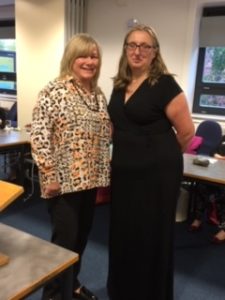 Women’s Aid, one of the Club’s charities this year, was the subject of last Thursday’s meeting and the guest speaker, Heather Williams, was undoubtedly passionate about her work in this field. Heather has been Interim Manager at Perthshire Women’s Aid since last July and has worked in the Women’s Aid network for the last 16 years managing local groups across Scotland.
Women’s Aid, one of the Club’s charities this year, was the subject of last Thursday’s meeting and the guest speaker, Heather Williams, was undoubtedly passionate about her work in this field. Heather has been Interim Manager at Perthshire Women’s Aid since last July and has worked in the Women’s Aid network for the last 16 years managing local groups across Scotland.
Although many people’s idea of domestic abuse is one of physical violence, this is only one type of abuse and a less common one now than decades ago. Instead, the abuse can very often be excessive controlling of every aspect of the woman’s life, checking her phone, her spending, where she goes, whom she meets. It can be isolation, not allowing her to see her family or previous friends. In fact sometimes she may even initially look on this, or excuse it, as caused by her partner’s desire to protect her because of his love for her. Or it may be humiliation, making her feel useless, stupid, unattractive and thereby losing all self-confidence.
It can often result too in the woman blaming herself if her partner is upset or angry, making her wonder what she had done wrong or what she could have done differently to prevent this reaction, feeling it was her fault. This can result in her using an excessive and exhausting amount of energy, always trying to find out what her partner really expects from her.
The charity’s work is also very focused now on the children of such a partnership for, though the violence may not be directed at them, they can suffer from it in a way which may affect them and their future lives. Children from the age of 3 to 18 are helped in many ways including trips and holidays. Now, where possible, efforts are made to keep the mother and children in the family home to provide stability, where beforehand in these circumstances it was more usual for them to flee to a refuge. 50% of women who seek the shelter of a Women’s Aid refuge refer themselves while others may be referred by Police, Social Work or family and friends. Apart from a safe haven, the charity offers a counselling service and a recovery programme.
Heather believed that, through education, an important step forward could be made to break the chain of violent and controlling behaviour and give an understanding of what a healthy family relationship can, and should, be without fear or intimidation, but with everyone having their own space, to live, develop and grow.
After the opportunity for questions, Anne Gilzean thanked Heather and invited members to join her in showing their appreciation to Heather for sharing her knowledge and experience of her work and the very important, and sadly still necessary, work of Women’s Aid.
October 2018 – Maggie Lennon from Building Bridges
Members of SI Crieff welcomed Maggie Lennon, Director of The Bridges Programmes Charity in Glasgow. Previously Maggie was an award winning bookseller, ran her own company and was former Editor of the Weekend Scotsman but she started working with asylum seekers and refugees in 2002 and set up the Bridges Project in response to the growing racial tension in the city. The programme has since grown and became the charity The Bridges Programmes in 2005 with its main aim being to find work placements for people whose first language is not English and who have left another country hoping for a better life in Scotland. The aim is to find placements for people doing work at the level and of the type which they did in their previous countries, it is not to ‘steal’ the jobs of others here.
The speaker described the many real difficulties encountered by refugees to this country and the lack of understanding held by many people of their true plight on arriving here, often after dreadful suffering and hardship. She explained how over the centuries there have always been people fleeing from terror in many parts of the world and it is only because until the last few years Europe has not experienced such migration since the end of WW2 when hundreds of thousands of displaced people were moving all over the continent and beyond. Since then, on the whole, there has been peace.
The problems and difficulties encountered by female refugees, who overall outnumber males, were the main focus of Maggie’s talk. Officialdom does not always help, particularly in clarifying public understanding and the wording of The 1951 UNHCR Refugee Convention (amended by the 1967 Protocol) urgently requires updating as it is very much written for men. Maggie outlined the many additional problems for women who generally are, and are held as, responsible for the welfare of dependent children but also in some cultures are regarded as of less importance and frequently answerable and subservient to men. In such cases the women are also less likely to speak English which makes their lives even more difficult. It is hard, especially in the current western climate, to comprehend the problems they face.
It was a hard hitting and eye opening talk giving members some insight into a completely unfamiliar and unknown world and one which raised a lot of questions and reaction. It was clear the speaker was passionate about the work done by the charity and the elation she and her team feel when they are successful in helping people in really difficult circumstances..
September 2018- Adam Lang talks about SHELTER
Adam Lang , Head of Communications and Policy with Shelter Scotland , recently spoke to members of SI Crieff about the charity which marks its 50th anniversary this year. He gave an enthusiastic and inspirational talk on the background and work of the charity and it was obvious how dedicated and devoted he is to his work.
Shelter Scotland was formed in 1968 and it is a sad reflection on today’s society, in one of the world’s wealthiest countries that such an organisation should still be so necessary 50 years on but sadly their services and help are needed as much as ever.
It is a human right recognised by the UN, that everyone is entitled to a home, but for most of us living comfortable lives here in Scotland it is hard to believe that many children are still raised in poverty and an appalling number of families are classed as homeless while many thousands more live in inadequate and unhealthy housing. All the time there are also thousands living in temporary accommodation awaiting their own homes.
The word homeless immediately conjures up the picture of people begging and living rough on the streets but it stretches far beyond that.
Homelessness can affect anyone. Shelter has helped thousands over the years from rich people who, through no fault of their own, have suddenly lost everything, to many who have never known anything other than a desperate existence, be it as a result of family breakdown, drugs, alcohol or many other causes.
Shelter’s main aim is that everyone should have a decent home, which is the basis of a healthy, hopeful and happy life. No one deserves less. Shelter offers advice, information and advocacy to people in housing need and, by campaigning for lasting policy change, seeks to end the housing crisis for good.
More social housing is now being built than for many years and new laws brought in offering some protection to tenants of privately rented houses but much remains to be tackled. Shelter Scotland operates all over the country and regrettably it does not look like its work will be over anytime soon.
7 June 2018 Uganda Childbirth Injury Fund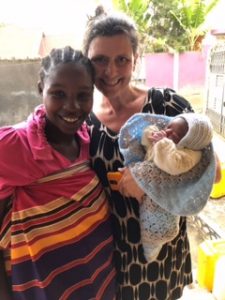
We were very pleased to welcome a large number of friends to hear guest speaker Kate Darlow, Consultant Obstetrician and Gynaecologist from Borders Hospital in Melrose, who came to talk about her work with the Uganda Childbirth Injury Fund, one of the club’s chosen charities for this year.
Kate explained how she is a member of a team who, voluntarily and using their own time, taking either unpaid or annual leave, visit Uganda twice or three times a year for two weeks to help women who suffer from Obstetric Fistula. This is most often caused by prolonged and complicated labour due to delay in seeking medical help in a rural area where the nearest health centre can be an eight hour walk away. Results can be stillborn births and mothers left with an obstetric fistula, something mercifully rare in the UK but common in Uganda where there are between 50,000 and 100,000 cases annually, causing infertility as well as social isolation because of distressing symptoms such as incontinence. Patients range in age from 16 to 50.
Radio announcements about the Village Project are made in advance of the team’s arrival and these reach many women in remote rural areas giving them the opportunity to get to the hospital for treatment. Normally about 50 women are waiting for the team’s arrival and they spend about three weeks there for surgery and recuperation.
Five days after arriving, in a hospital rented by the team, the highly skilled doctors and nurses start operating using spinal anaesthetic along with other somewhat less specialised equipment. Their work is frequently closely observed by students keen to learn.
There is a very good success rate though it can prove awkward persuading the patients to stay for the required two to three week recovery period to ensure their wellbeing as they are keen to return to work on their farms. Activities such as knitting are encouraged to occupy them as this is productive and social, so amongst all the other equipment transported from home by the medical staff can be large quantities of knitting needles and wool! Patients are frequently accompanied to hospital by family members who care and cook for them during their stay. For many of the patients this may be the first opportunity they will have to meet others in a similar situation.
All money raised by and for this dedicated team is put towards equipment and the upgrade of the wards. They willingly give their time and skills at no cost saying the recovery and appreciation of the patients and their families is ample reward.
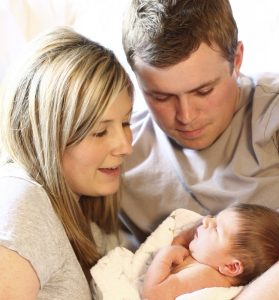 May 2018 – Aberlour Perinatal Befriending Project
May 2018 – Aberlour Perinatal Befriending Project
This year we are supporting the work of the Aberlour Perinatal Befriending Project. The Service works with families where a parent is struggling with their emotional health and well-being or has been diagnosed with a perinatal mental illness.
The aim is to improve a parent’s health & wellbeing by supporting them to form a positive relationship with their baby; reduce the social isolation of families ; increase parent’s self- confidence.
Catherine and Angie, two of the organisers, came to our meeting on 3rd May and held us spellbound as they talked about the challenges and successes of the project.


